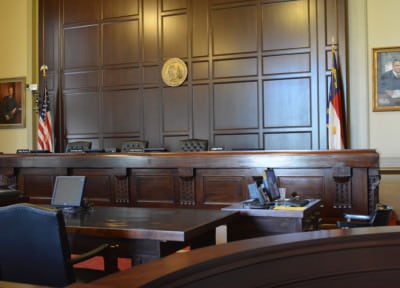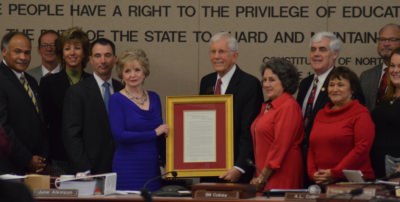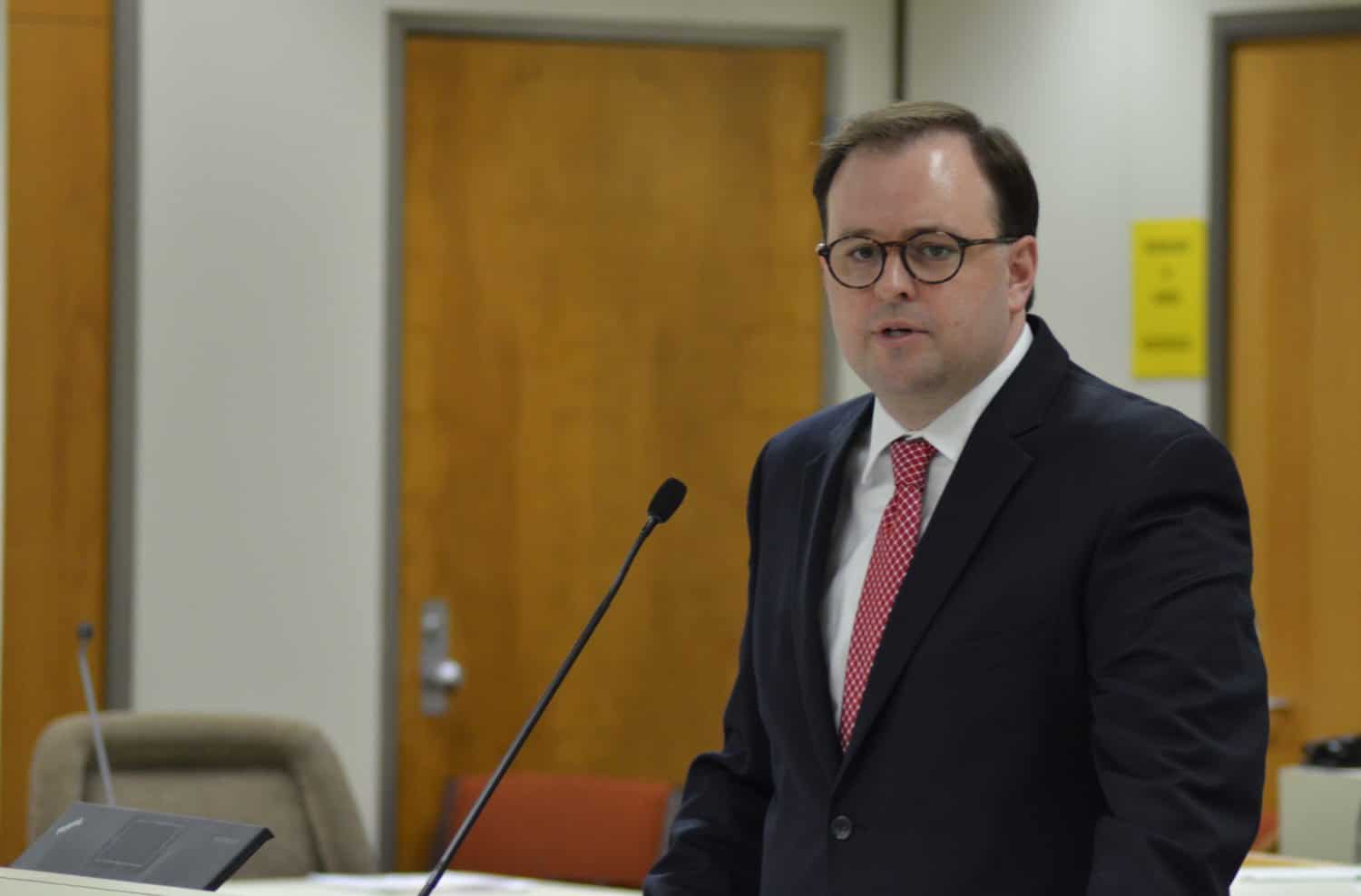Senator Chad Barefoot, R-Wake, is the sole sponsor of Senate Bill 599 which opens up the educator preparation system in North Carolina to organizations other than universities.
In the fourth quarter of 2016, the Committee to Elect Chad Barefoot received $5,000 from Texas Teachers of Tomorrow, an organization that could stand to benefit from the bill.
Barefoot said he did not solicit the contribution and has never heard of the person listed as giving the contribution on behalf of Texas Teachers of Tomorrow: its president, Vernon Reaser.
“I would just have to say, my only comment on that is people know that I’ve been working to expand access to teacher education in North Carolina, and I assume they’re supportive of that,” he said.
Barefoot said that the donation did not influence his work on the legislation and that Teachers of Tomorrow is not pleased with his bill. “It delays their ability to enter North Carolina and become a program,” he said.

The contribution nears the 2016 maximum annual contribution limit of $5,100, according to the Campaign Finance Office of the State Board of Elections. The donation was made in the month prior to the start of the current General Assembly long session.
Teachers of Tomorrow is an alternative teacher preparation organization that is mostly online. It started in Texas and has branched out to four other states: Indiana, Florida, Nevada, and South Carolina. It targets “career changers,” people from other professions who want to become teachers, according to Dave Saba, chief development officer of Teachers of Tomorrow. He said the average age of a student in the program is 32.
Under Barefoot’s bill, the organization could start a teacher preparation program in North Carolina by going through and getting approval under a process set up in the legislation.
The bill creates the Professional Educator Preparation and Standards Commission, a body comprised of teachers and administrators. They would make recommendations on educator preparation programs to the State Board of Education, which would have the final say on the standards for programs and if programs meet them.
The bill passed the Senate but has not yet been heard in the House. It is slated to be heard today in the House K-12 education committee. If it passes the House and is signed by Governor Roy Cooper, the State Board can start accepting applications for approval no later than March 1, 2018. Organizations who receive the approval would be able to start accepting students in the 2018-19 school year.
Saba said he met Barefoot last session and talked about a variety of subjects, including the issue of the teacher pipeline: the number of teachers being trained in the state. In North Carolina, for instance, enrollment in schools of education across North Carolina dropped about 30 percent between 2010 and 2015.
“We were looking forward to working with him…we like to work with anybody who is very education minded that is looking to increase that pipeline of teachers,” Saba said.
When asked about the campaign contribution, Saba said his organization was interested in keeping the conversation going with Barefoot.
That rationale falls in line with how Calder Burgam, researcher for FollowTheMoney.org, thinks about campaign contributions. His organization tracks the flow of money in political races. He said campaign contributions are more about getting access to candidates.
“A lot of times when you’re looking at contribution data, it’s really not a quid pro quo type of relationship,” he said.
He said that research shows that political donors get more access to elected lawmakers than the general public.
Two vocal opponents of Barefoot’s bill, Senators Erica Smith-Ingram, D-Northampton, and Gladys Robinson, D-Guilford, find the contribution concerning.
“That does give me pause,” Smith-Ingram said. At one point, she was a co-sponsor on Barefoot’s bill but said she took her name off of it when her concerns were not addressed as the bill made its way through committee.
Barefoot said he modeled his legislation on Texas, and Smith-Ingram took issue with that as well.
“Why are we going to Texas when historically it is our state that has been an educational flagship?” she said.
Texas, where Teachers of Tomorrow started, has an open educator preparation system that allows organizations other than universities to train teachers.
“No wonder he was pushing it,” Robinson said when told of the campaign contribution.
“What we ought to do, Senator Barefoot and the rest of us, is be authentic to what we need in North Carolina, as opposed to taking campaign contributions to promote somebody else’s agenda,” she said.
Terry Stoops, vice president for research and director of education studies at the John Locke Foundation, is less concerned with the campaign contribution. He said that if Barefoot’s legislation had carved out a narrow opening to specifically allow Teachers of Tomorrow into the state, that would been a red flag.
“If it’s giving them an exclusive franchise or making them the sole provider I don’t think I would be very pleased with that,” he said.
But he said the legislation does not do that, but rather opens up the state to other teacher preparation organizations.
In addition, Stoops said Barefoot has been talking about this particular issue for years, and the problem of the teacher pipeline is a longstanding one. A bill like Barefoot’s was just a matter of time, he said.
“I think it would have happened anyway,” he said.
E-mails between Barefoot and a representative of Teachers of Tomorrow show the organization’s concern that, under Barefoot’s bill, it would take the organization longer to get up and running in North Carolina than under a bill in the House: House Bill 634.
The proposed measure in the House directs the State Board to approve at least one but no more than four teacher education programs for lateral entry. Lateral entry students — professionals from other career fields trying to get into education — are the core target group of Teachers of Tomorrow.
In the e-mail exchange, the Teachers of Tomorrow representative suggests concessions to Barefoot that could help alleviate the organization’s concerns, but Barefoot pushes back against the suggestions. Ultimately, the suggestions from the e-mail exchange did not make it into the bill.
“I’ve said this during my speeches that we’re continually being asked to create exemptions within our statutes,” Barefoot said, adding that he does not approve of such concessions.
Saba said his organization supports both bills but makes clear that Teachers of Tomorrow would prefer a shorter timeline to approval.
“For us, sooner would be better,” he said.
Regardless, the organization seems confident it will ultimately be able to enter the state.
The website for the Department of the Secretary of State shows that “North Carolina Teachers of Tomorrow LLC” applied for a “certificate of authority to transact business in the state of North Carolina,” in March of this year.
Saba said the organization was approved three weeks ago to operate in South Carolina. Since that time, he said, Teachers of Tomorrow has received 485 applications, including 70 from North Carolina.
“To me it shows pent up demand,” he said. “It means if we got into North Carolina we could have similar success tracking mid-career professionals who want to get into teaching.”
Barefoot argues that the idea that he was swayed by a campaign contribution from Teachers of Tomorrow does not make sense. He said the bill that most favors the organization is HB 634.
“They have the bill they want,” he said. “I didn’t introduce it. Somebody else introduced it.”
He added the following in an e-mail.
“I received an unsolicited contribution from a donor who I do not know and have not communicated with, and whose organization is advocating for an exemption that I do not support and did not include in my bill. The entire premise of my legislation is to create an even playing for everyone. What is the story?”
The House K-12 education committee meets at 10 a.m.
Recommended reading




